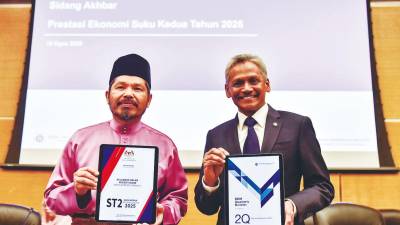KUALA LUMPUR: Bank Negara Malaysia (BNM) sees no further change in its forecast as the US tariff aligns with its assumptions, noting that the new 2025 gross domestic product (GDP) growth forecast of 4% to 4.8% already factors in possible outcomes.
BNM governor Datuk Seri Abdul Rasheed Ghaffour said there is no need for the central bank to revise the growth numbers further, adding that BNM has modelled two scenarios with a low tariff outcome of 13% US effective tariff rate on the world and a high tariff outcome of 29%.
“The tariff assumptions are already ‘priced in’ to the growth forecast. Even with the new 19% US tariff agreed in the negotiations, the number falls within that 13%–29% range we had budgeted for,“ Abdul Rasheed said at a press conference on Malaysia’s second-quarter GDP today.
He said there is no new factor that would cause the central bank to recalculate its growth projections, as the actual tariff outcome sits comfortably within the range.
The governor emphasised that tariffs are not an effective solution to trade relations issues, noting that a rule-based system remains the best approach.
While acknowledging that tariffs benefit no one, he welcomed the conclusion of tariff talks between the US and its trading partners, saying the outcome provides much-needed certainty for businesses, investors, and households.
Yesterday, the central bank announced that Malaysia’s economy grew 4.4% in the second quarter of 2025, matching the first quarter’s performance, driven by resilient domestic demand despite softer external conditions.
Household spending remained robust, supported by a firm labour market and income-related policy measures such as higher minimum wages and civil service pay revisions.
Private and public investments recorded stronger gains, underpinned by new and ongoing projects.
On the external front, export growth moderated due to weaker commodity-related shipments, partly offset by sustained electrical and electronics exports and healthy tourism activity.
Imports expanded, reflecting higher demand for capital goods in line with increased investment.
On the supply side, services growth was driven by consumer-related and government services while manufacturing benefited from domestic-oriented clusters but was hindered by disruptions in petroleum output.
Agriculture improved on higher oil palm production but mining contracted due to planned maintenance work.
On a seasonally adjusted basis, GDP rose 2.1% quarter-on-quarter, compared with 0.7% in the previous quarter.
Headline inflation eased to 1.3% from 1.5% in the first quarter, while core inflation held steady at 1.8%. The moderation reflected lower fuel prices and slower increases in food costs, partially offset by a smaller decline in mobile service prices.
Inflation pervasiveness eased to 41.8%, in line with the long-term average.
Meanwhile, the ringgit’s nominal effective exchange rate appreciated by 1.5% against the currencies of major trading partners and strengthened by 5.1% against the US dollar, supported by broad weakness in the greenback, expectations of slower US growth and proactive domestic foreign exchange market measures.
Private-sector credit grew 5.2%, with household loans rising 6% and business loans increasing 4.5%, reflecting steady financing demand for investment and working capital.
Looking ahead, Abdul Rasheed said the external environment remains challenging, and tariff uncertainty continues to
linger, and the impact will take time to materialise fully.
“Nonetheless, let me stress that Malaysia is facing these challenges from a position of strength. Our economy remains on a solid footing, supported by resilient domestic demand, continued demand for E&E goods and a diversified export structure.
“The steady rollout of structural reforms, such as the national master plans and fiscal reform measures, is critical to boost our resilience against future shocks,“ he said.
